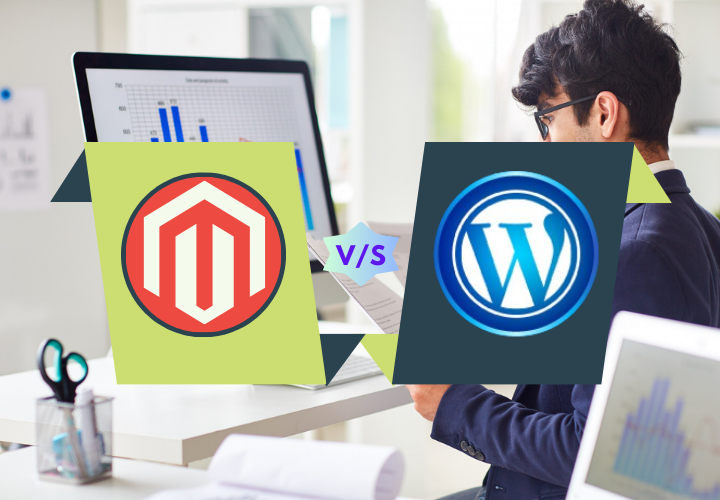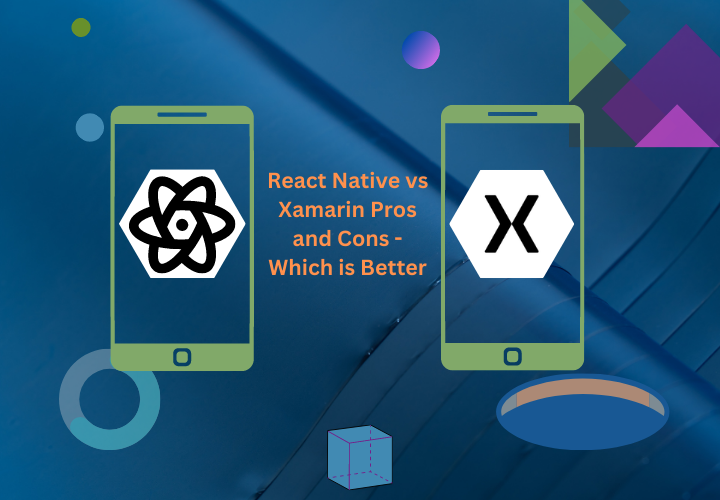
Numerous options are available for developing e-commerce websites, but not all of them are the same and offer robust features and functionalities. Whenever someone discusses the top e-commerce website builder, two names typically come to mind – WordPress and Magento. And the most critical question that immediately comes to mind is – Which is better for online businesses?
The success of your online business in the realm of e-commerce depends on the platform you choose. Magento and WordPress are two prominent names that often come up when discussing e-commerce development and e-commerce development services. As we know, every platform has advantages and meets various needs. So, let’s delve into the comparison between Magento and WordPress to help you decide which platform suits your e-commerce ambitions the best in this blog post.
Let's understand about Magento & WordPress:
Magento is a robust and feature-rich e-commerce platform designed specifically for online stores. It offers powerful tools for managing products, payments, and orders. Magento is known for its scalability, making it suitable for businesses of all sizes, from startups to enterprise-level operations.
WordPress, initially a blogging platform, has evolved into a versatile Content Management System (CMS) that powers a significant portion of the web. With the help of plugins like WooCommerce, WordPress can transform into a capable e-commerce platform.
| Strengths of Magento: |
| Scalability: Magento can handle large product catalogues and high traffic volumes, making it ideal for growing businesses. |
| Customization: It offers extensive customization options, allowing developers to tailor the store’s appearance and functionality to specific needs. |
| Performance: It is optimized for e-commerce performance, providing fast loading times and efficient transaction processing. |
| Extensions: The Magento marketplace offers a wide range of extensions and plugins to enhance the store’s capabilities. |
| SEO-Friendly: Magento is built with SEO in mind, providing tools and features to optimize your store for search engines. |
| Strengths of WordPress: |
| User-Friendly: WordPress is known for its ease of use, making it accessible to beginners who want to set up an online store quickly. |
| Flexibility: It offers thousands of themes and plugins, including WooCommerce, to customize your store’s design and functionality. |
| Content Management: WordPress excels in content management, making it ideal for businesses that want to integrate blogging with e-commerce. |
| Community Support: WordPress has a vast community of users and developers, providing ample resources and support. |
| Cost-Effective: Many WordPress plugins are free or affordable, making it a budget-friendly option for small businesses. |
Magento vs WordPress - A Detailed Comparison:
1. Performance and Scalability:
- Magento: Built specifically for e-commerce, Magento excels in performance and scalability. It can efficiently handle extensive inventories and high traffic volumes.
- WordPress: While WordPress is capable, it may require optimization and caching plugins to match Magento’s performance for larger stores.
2. Customization and Flexibility:
- Magento: Offers deep customization options with access to the codebase, making it suitable for complex e-commerce needs.
- WordPress: Flexible with numerous themes and plugins, but customization options might be more limited compared to Magento.
3. Ease of Use:
- Magento: Generally requires a learning curve and is more developer-centric, suited for those with technical expertise.
- WordPress: User-friendly interface makes it accessible to beginners, enabling quick setup and management of e-commerce stores.
4. E-commerce Features:
- Magento: It has sophisticated e-commerce capabilities right out of the box, such as order processing, marketing tools, and product management.
- WordPress: Relies on plugins like WooCommerce for e-commerce functionality, offering a wide range of extensions but requiring additional setup.
5. SEO and Marketing:
- Magento: Offers robust SEO capabilities, allowing for detailed optimization of product pages and site structure.
- WordPress: Integrates well with SEO plugins like Yoast SEO, providing comprehensive tools for optimizing content.
Choosing the Right Platform for Your E-commerce Store:
Choose Magento if: | Choose WordPress if: |
You require a highly scalable and performance-oriented platform for your business. | You prioritize ease of use and quick setup. |
Your business demands extensive customization and complex functionalities. | Your e-commerce needs are relatively straightforward and don’t require extensive customization. |
You anticipate significant growth and need a platform that can adapt to evolving needs. | You want to integrate e-commerce seamlessly with content marketing and blogging.
|
In summary, in this comprehensive guide, we’ve thoroughly discussed how and when to choose Magento and WordPress for our website development or online e-commerce store. As we know, both Magento and WordPress are formidable platforms for e-commerce development, each with unique strengths and use cases. The choice ultimately depends on our business requirements, technical capabilities, and long-term goals. Magento is ideal for large-scale enterprises and businesses needing robust customization, while WordPress suits small to medium-sized businesses looking for simplicity and versatility. Whatever platform you choose, leveraging their capabilities can lead to a successful online store.
If you also want to develop your online store or website but need help deciding which platform will work best for you! Reach out to PECS, the best web development company in India. We will help you expand your company and make it even better by delivering exceptional results. Our knowledgeable staff keeps up with the most recent advancements in technology and industry trends, so your project will use the best tools and techniques available.
Related Posts

Why Flutter is the New Hue in Mobile App Development?
As mobile app development continues to evolve at a rapid pace, developers are constantly searching for the most efficient and…

The Ultimate Guide to PHP Monitoring Tools for 2024
PHP remains one of the most popular programming languages for web development, powering millions of websites globally. As applications grow…

The Pros and Cons of Native vs. Xamarin Mobile App Development
Today in the world of technology, businesses consider mobile app development the best way to boost sales and connect with…
